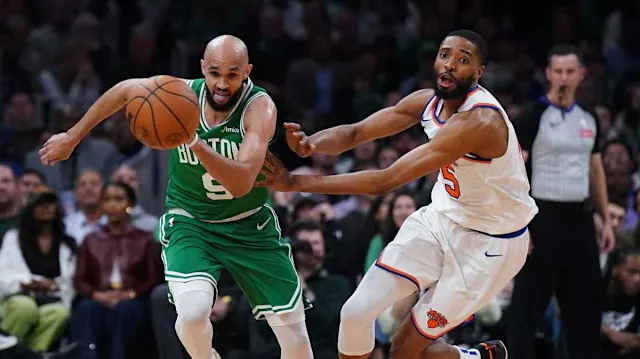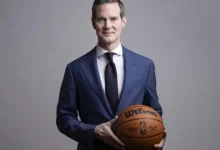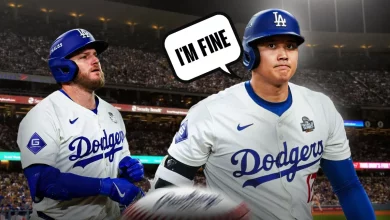Derrick White recalls Gregg Popovich’s NSFW message when traded from San Antonio to Boston, expressing surprise, familiarity with teammates, and mixed feelings about the unexpected move.

Derrick White’s recounting of his trade from the San Antonio Spurs to the Boston Celtics offers an insightful glimpse into the emotional and professional nuances players experience during such pivotal moments in their careers. White, who had spent several seasons developing under the legendary coach Gregg Popovich, found himself suddenly displaced at the trade deadline, a moment that can be both exciting and challenging. His vivid description of the interaction with Popovich, particularly the NSFW message, highlights the raw, unfiltered nature of communication within professional sports and underscores the human side of a game often perceived through statistics and highlight reels. This story not only humanizes White’s journey but also sheds light on the dynamics of NBA trades, the relationships players forge with coaches and teammates, and the emotional rollercoaster that accompanies such career-altering decisions.
White’s tenure with the San Antonio Spurs began in 2017, a period during which he developed into a versatile guard known for his scoring ability, defensive tenacity, and basketball IQ. Under Popovich’s leadership, White learned the intricacies of team basketball, discipline, and resilience. Popovich, renowned for his candidness and no-nonsense approach, commands respect through a mix of mentorship and tough love. White’s admiration for Popovich is evident in his tone, acknowledging the coach as a figure of influence and respect. However, the trade process introduces an entirely different dynamic—one filled with uncertainty, emotion, and the realities of professional sports management. White’s recounting of the moment he was told about his trade encapsulates this transition from stability to upheaval.
The narrative begins with Popovich entering the room, a familiar figure who, in White’s words, casually drops the bombshell: “Uh, we traded you.” The straightforwardness of Popovich’s statement underscores the blunt honesty that has become a hallmark of his coaching style. White’s initial reaction, “Shut up, Pop,” reveals a mixture of disbelief and an attempt to process the unexpected news. It humanizes the moment, showing that even for seasoned professionals, such life-altering announcements can momentarily disrupt their composure. The casual tone of White’s recounting suggests a level of comfort and familiarity with Popovich, but also highlights the raw honesty that often accompanies such conversations.
What makes White’s story particularly compelling is his vivid memory of Popovich’s NSFW message. The phrase “we wouldn’t f*ck you,” used by Popovich, is an unfiltered, candid expression of the reality of NBA trades—that players are commodities, and trades happen swiftly and sometimes brutally. White’s reaction, a mix of surprise, humor, and perhaps a bit of bewilderment, underscores the human side of the transaction. Despite the professionalism players maintain, these moments reveal genuine emotion and candidness rarely seen in official press releases or media interviews.
White’s recounting continues with the coach assuring him that he’ll be comfortable in Boston, emphasizing the familiarity with teammates like Jayson Tatum, Jaylen Brown, and Marcus Smart. This reassurance is a common practice in trades, as teams aim to ease players’ anxieties about moving to a new environment. White’s acknowledgment that he played summer league with these players and knew them personally adds depth to his story. It suggests that, despite the abruptness of the trade, White was able to leverage existing relationships to facilitate the transition. His words, “I thought I’d fit well there,” reflect a mixture of optimism and curiosity—an open-minded approach to what was an unexpected change.
The emotional complexity of White’s experience is palpable. On one hand, he’s excited about the opportunity to join a franchise like the Celtics, a team with a rich history of success and a promising future. On the other hand, he is puzzled about the reasons behind the trade, wondering, “What did I do?” This question resonates with many players who find themselves suddenly uprooted, questioning whether their performance, attitude, or role within their former team was lacking. It also highlights the uncertainty that accompanies trades—players often have limited insight into the strategic or financial reasons behind such decisions, fueling feelings of confusion or frustration.
White’s story also emphasizes the importance of communication and camaraderie within professional sports. His familiarity with Celtics players suggests that relationships and team chemistry are vital in easing the adjustment process. Moving to a new team involves not just learning new plays or systems but also integrating into a different locker room culture. White’s prior experience with teammates like Tatum and Brown likely helped him feel more at home, which is crucial for his performance on the court and his mental well-being.
Furthermore, White’s candid storytelling on the podcast “White Noise” serves as a reminder of the human side of athletes often overshadowed by their on-court achievements. His openness about the NSFW message and his feelings about the trade demystifies the process, making it more relatable to fans and aspiring players. It highlights that, despite the glamour and fame, NBA players are individuals navigating complex emotions, relationships, and career decisions.
From a broader perspective, White’s experience underscores the evolving nature of NBA trades in the modern era. Trades are no longer just about team needs but also involve financial considerations, player preferences, and long-term strategic planning. The candidness White shares about his interaction with Popovich reveals the often unfiltered reality behind these moves. It also underscores the importance of players’ mental resilience in adapting to change, maintaining professionalism, and embracing new opportunities.
The story also touches on the importance of mentorship and leadership. Popovich’s straightforward approach, while perhaps jarring, reflects a coaching style rooted in honesty and accountability. White’s positive remarks about Popovich, despite the NSFW message, suggest a deep respect for the coach’s wisdom and leadership. This dynamic exemplifies the complex relationships between players and coaches—where honesty and tough love often coexist with mentorship and guidance.
In conclusion, Derrick White’s recounting of his trade from the San Antonio Spurs to the Boston Celtics provides a candid, human perspective on a pivotal moment in his career. His description of Popovich’s NSFW message captures the raw honesty and emotional intensity of NBA trades, highlighting the human side of professional sports that fans rarely see. White’s openness about his feelings, familiarity with teammates, and respect for his former coach emphasize the importance of relationships, communication, and resilience in navigating career shifts. As White continues his journey with the Celtics, his story serves as a reminder that behind the accolades and highlight reels are individuals experiencing real emotions, making their stories all the more relatable and inspiring.








